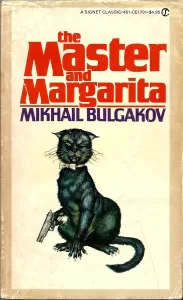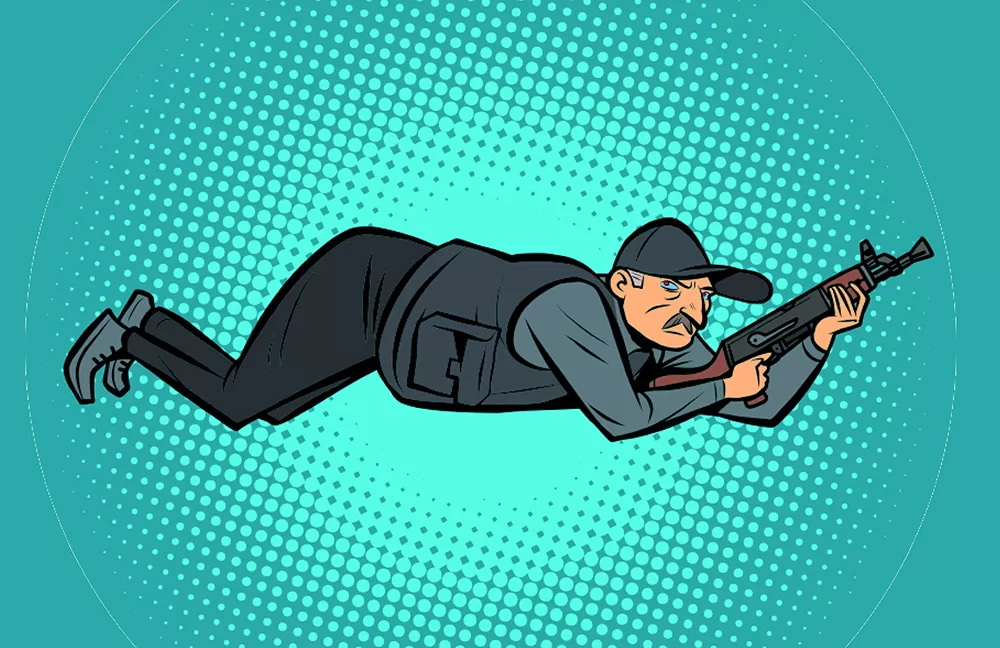An American tells a Russian that the United States is so free he can stand in front of the White House and yell, “To hell with Ronald Reagan.’’ The Russian replies: “That’s nothing. We also have freedom of speech! I can stand in front of the Kremlin and yell, ‘To hell with Ronald Reagan,’ too.’’
Most would not associate Belarus, known in Western media for its authoritarian regime, with comedy. And it’s true that the current situation is indeed more tragic than comical. Satirical accounts on Twitter and Instagram sharing jokes and memes get designated as “extremist” and a simple like or subscription can land you in jail.
However, this is where humour has an important role and dates back to a longstanding political tradition in the Soviet Union where satire and jokes were ways to bypass censorship, serve as an antidote to official propaganda and generally not let the reality around you get you down.
 Probably the best-known book of political satire in the Soviet Union was Mikhail Bulgakov’s The Master and Margarita, published only after the author’s death in 1966 and promptly banned, which cast Stalin in the role of the devil. As Viv Groskop wrote in her excellent re-reading of classical literature called The Anna Karenina Fix:
Probably the best-known book of political satire in the Soviet Union was Mikhail Bulgakov’s The Master and Margarita, published only after the author’s death in 1966 and promptly banned, which cast Stalin in the role of the devil. As Viv Groskop wrote in her excellent re-reading of classical literature called The Anna Karenina Fix:
“I sometimes wonder if The Master and Margarita explains many people’s indifference to politics and current affairs. They are deeply cynical, for reasons explored fully in this novel. Bulgakov describes a society where nothing is as it seems. People lie routinely. People who do not deserve them receive rewards. You can be declared insane simply for wanting to write fiction. The Master and Margarita is, ultimately, a huge study in cognitive dissonance. It’s about a state of mind where nothing adds up and yet you must act as if it does. Often, the only way to survive in that state is to tune out.”
Similarly, in 1980 the Czech-French novelist Milan Kundera said: “I learned the value of humour during the time of Stalinist terror. I could always recognise a person who was not a Stalinist, a person whom I needn’t fear, by the way he smiled. A sense of humour was a trustworthy sign of recognition. Ever since, I have been terrified by a world that is losing its sense of humour.”
In the Soviet Union Brezhnev jokes were especially popular, making fun of his stumbling, often incoherent speech, public mishaps and penchant for kissing other political leaders on the mouth.
Often he was made fun of as a totally useless leader. Take this joke that circulated at the time:
Lenin proved that even female cooks could manage a country.
Stalin proved that just one person could manage a country.
Khrushchev proved that a fool could manage a country.
Brezhnev proved that a country doesn’t need to be managed at all.
Or this:
With Lenin, it was like being in a tunnel: You‘re surrounded by darkness, but there’s light ahead. With Stalin, it was like being on a bus: One person is driving, half the people on the bus are sitting [“sitting” in Russian having a secondary meaning of doing time in prison] and the other half are quaking with fear. With Khrushchev, it was like at a circus: One person is talking, and everyone else is laughing. With Brezhnev, it was like at the movies: Everyone’s just waiting for the film to end.
This tradition has certainly continued in Belarus with Alyaksandr Lukashenka, who likes to refer to himself as “bat’ka” in Belarusian or a “father of the nation”. People mock him both for his poor knowledge of Belarusian, which he uses in combination with Russian, and his wannabe macho appearances and pronouncements.
One of the most well-known Belarusian stand-up comics, Slava Komissarenko, went viral and became famous overnight when he made fun of Lukashenka’s Rambo-like appearance with a gun at the height of the 2020 protests, ready to defend the presidential palace from completely peaceful protesters who were just standing there. Lukashenka made a ‘heroic’ dash from the helicopter and then brandished guns, which he waived at the protesters before hurriedly disappearing inside flanked by security. Numerous memes emerged after to spoof the moment.
Komissarenko had himself joked about Lukashenka already, back in 2015. These often innocent barbs were still considered dangerous enough for state television to cut them out. Back then, for example, he said: “Recently we had presidential elections. Surprising, isn’t it? The fact that there are elections. Everyone thought it is a lifetime job. He got 85.3 %. I think he can do better. But it’s not his last time, only fifth.”
After his 2020 stand-up authorities evoked his licence (“I know from where the only dislike under my YouTube video came from,” he joked.) Later he was forced to leave the country. First he went to Kyiv and when the war started on to Warsaw where he is based now along with other politically critical comedians. It’s from there they run their shows. Komissarenko’s Instagram account is followed by more than 670,000 people and his YouTube videos routinely gather millions of views and likes.
Another humorous X/Twitter account that recently caught the attention of authorities, who again deemed it “extremist”, is “Sad Kolya”, under the @sadmikalai handle. It impersonates Lukashenka’s son Kolya, who tweets about his daddy and the misfortune of being his son. “Papa called Prigozhin who assured him that he had been killed” one of the recent ones reads. Another: “I hope my dad runs out before my passport.”
During the protests it was a great source of comfort and relief to read these humorous one-liners. The avatar on the account has both Belarusian and Ukrainian flags in solidarity with Ukraine, and the cover photo features a real photo of Kolya standing between Putin and Lukashenka.
When the war started in Ukraine some of the memes that got incredibly popular made fun of Lukashenka and the statement he made on state TV, where he promised to show everyone “where Belarus was going to be attacked from” by Ukraine. One meme put him in various situations endlessly repeating this phrase to everyone’s exasperation. Another meme looked like a screenshot from a WhatsApp chat with the avatar of Lukashenka texting in the middle of the night as if to his girlfriend. “Are you asleep? Just wanted to show you where Belarus was going to be attacked from”.
The Belarusian stand-up scene is now mostly active in Warsaw and Vilnius, with occasional tours abroad. In Belarus those who stayed (about 30 stand-up comics) cannot talk about politics at all and the material needs to be sent to the Ministry of Culture for approval before the show. They stick to safer topics of dating and other things that make living under dictatorship more or less bearable. But the politics still can sneak in. Just recently Komissarenko himself unexpectedly became the subject of jokes when some details about his new wife’s saucy past were revealed.
“I feel for you” wrote one of the commentators on social media. “My friend recently married a guy and it turned out he likes Shaman [a nationalist Russian singer loved by the Kremlin]. So remember it could have been much worse!!!”





